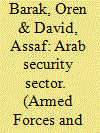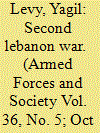|
|
|
Sort Order |
|
|
|
Items / Page
|
|
|
|
|
|
|
| Srl | Item |
| 1 |
ID:
100074


|
|
|
|
|
| Publication |
2010.
|
| Summary/Abstract |
This article discusses the lack of adequate attention to the Arab Security Sector and its complex political and social roles in the Arab States and presents the contours of a new research agenda for this topic. First, the authors demonstrate the insufficient scholarly attention accorded to the Arab Security Sector in several academic publications in the fields of Middle East Studies and Security Studies in the period 1990 -2005. Second, they focus on three major areas where recent theoretical and comparative advances in the study of civil-military relations have not been paralleled in the study of the Arab Security Sector: (1) the role of the Arab Security Sector in the process of state formation; (2) informal connections between actors within the Arab Security Sector and actors operating in the political system; and (3) the role of the Arab Security Sector in reflecting and reinforcing patterns of intersectoral relations in the Arab States.
|
|
|
|
|
|
|
|
|
|
|
|
|
|
|
|
| 2 |
ID:
100078


|
|
|
|
|
| Publication |
2010.
|
| Summary/Abstract |
Despite its social and political importance, veterans' policy is an overlooked subject in the field of civil -military relations. This article aims to discuss the theoretical problems of studying veterans' policy. It also proposes analysis of veterans' policy in Russia. The aim of the theoretical review is to underline the limits of traditional ways of viewing veterans' policy, which consider veterans' policy as a consequence of the development of military institutions. The article stresses the importance of taking into account the effect of societal factors in explaining veterans' policy. An examination of the Russian case demonstrates the historical development of an exclusive veterans' policy, including the construction of the privileged position for veterans of the World War II. It also analyses the changes of veterans' policy after the Soviet Afghan War of 1979 -89. Finally, the article highlights the principles of contemporary veterans' policy in Russia and explains why it cannot be changed without reconfiguration of civil-military relationships.
|
|
|
|
|
|
|
|
|
|
|
|
|
|
|
|
| 3 |
ID:
100077


|
|
|
|
|
| Publication |
2010.
|
| Summary/Abstract |
Armed conflict typically worsens civilian life chances. The effects of social militarization (maintenance of armed forces) and economic militarization (military expenditures) on civilian life chances are disputed, and the joint effect of armed conflict and militarization on civilian life chances has not previously been examined. This study examines the joint effects of three types of major armed conflicts and two types of militarization on civilian life chances, using a fixed-effects negative binomial cross-national panel analysis (1985-1998) of data from 175 countries with populations larger than two hundred thousand. General economic development, political regime, and country-specific effects are controlled. Armed conflict and militarization interact in affecting civilian life chances. Armed conflict results in higher levels of civilian mortality; militarization interacts with armed conflict, producing the best civilian life chances at either medium-low or medium-high levels of militarization.
|
|
|
|
|
|
|
|
|
|
|
|
|
|
|
|
| 4 |
ID:
100072


|
|
|
|
|
| Publication |
2010.
|
| Summary/Abstract |
The following article tests the hypothesis that veterans have better health if they were officers when they were in the U.S. military than if they served in the enlisted ranks. It examines this hypothesis by presenting results from logistic regressions that are based on four surveys: the National Survey of Veterans, the Survey of Retired Military, the Panel Study of Income Dynamics, and the Wisconsin Longitudinal Study. In all four of these surveys, the evidence is consistent with the hypothesis that military rank is associated with health, particularly among veterans who served longer. It also suggests that the health gradient by rank is independent of similar gradients by education and income as well as health differences by race. These findings indicate that health may be influenced not just by differences in civilian society but also by those in the military.
|
|
|
|
|
|
|
|
|
|
|
|
|
|
|
|
| 5 |
ID:
100075


|
|
|
|
|
| Publication |
2010.
|
| Summary/Abstract |
This article explores the phenomenon of military naming, that is, the act of giving a name to military practices such as military operations, weaponry, and military units. The basic theoretical supposition is that military naming is a simple and useful mechanism that might be employed to blur undesired aspects-such as the human and economical costs-associated with the respective practices. Inspired by John B. Thompson's ''strategies of operation of ideology,'' the research uses the construct of strategies of annihilative naming to analyze a corpus of 239 Israeli names of military operations and weaponry. By using names coming from nature and the Bible, the Israeli military uses three strategies-naturalization, euphemization, and legitimation-that mediate Israeli public opinion toward controversial military operations as well as weaponry development. Future research of other military names will support the construction of generalizations about this important phenomenon.
|
|
|
|
|
|
|
|
|
|
|
|
|
|
|
|
| 6 |
ID:
100073


|
|
|
|
|
| Publication |
2010.
|
| Summary/Abstract |
Israel's Second Lebanon War (2006) is a typical manifestation of a flawed war fought by a democratic society. As such, it represents an important opportunity to provide significant evidence regarding the validity of theories that deal with the "democratization of war" syndrome, that is, the limitations imposed on the way democracies wage war and how they cope with these limitations. This article argues that the events of the war exhibit four theoretical propositions, all of which are drawn from the U.S. post-Vietnam experience: speedy decision making to avert public disputes, a weak "civilian" government that struggles to restrain the military, the proclivity to shorten the war and reduce its costs, and the setting of overly ambitious war goals as a means of mobilizing public support. In short, the imperatives derived from the democratization of war syndrome produce mechanisms that work to heighten belligerence rather than temper it.
|
|
|
|
|
|
|
|
|
|
|
|
|
|
|
|
| 7 |
ID:
100079


|
|
|
|
|
| Publication |
2010.
|
| Summary/Abstract |
Multinational military missions increasingly rely on the recruitment of host nation interpreters. The purpose of this research note is to explore the relationship between the soldiers and these local translators during the International Security Assistance Force (ISAF) operation in Afghanistan. The findings suggest that more attention to the development of cross-cultural competencies among military personnel and a greater awareness of the precarious dynamics between the two parties may improve the cooperation between the soldiers and the local translators.
|
|
|
|
|
|
|
|
|
|
|
|
|
|
|
|
| 8 |
ID:
100076


|
|
|
|
|
| Publication |
2010.
|
| Summary/Abstract |
Venezuela, one of few Latin American countries that did not have to democratize during the Third Wave, veered hardest to the left at the turn of the century. Now, this country, despite its democratic tradition, apparently has most to fear with respect to continued civilian control of the military. This article shows how Venezuela's democracia pactada (democracy-by-pact) and its Bolivarian Revolution both permitted fusing of military with political power across policy areas. However, the emergence of a coordinate system for civilian control of the military protects Hugo Chávez even as it places certain constraints on the anti-American president. Moreover, this form of civilian control matches elements of the U.S. example. Accurate description, or coding, of Venezuela opens an avenue for improved military-to-military relations, which could, in turn, lay the foundation for constructive U.S.-Venezuelan engagement in the Western Hemisphere.
|
|
|
|
|
|
|
|
|
|
|
|
|
|
|
|
|
|
|
|
|